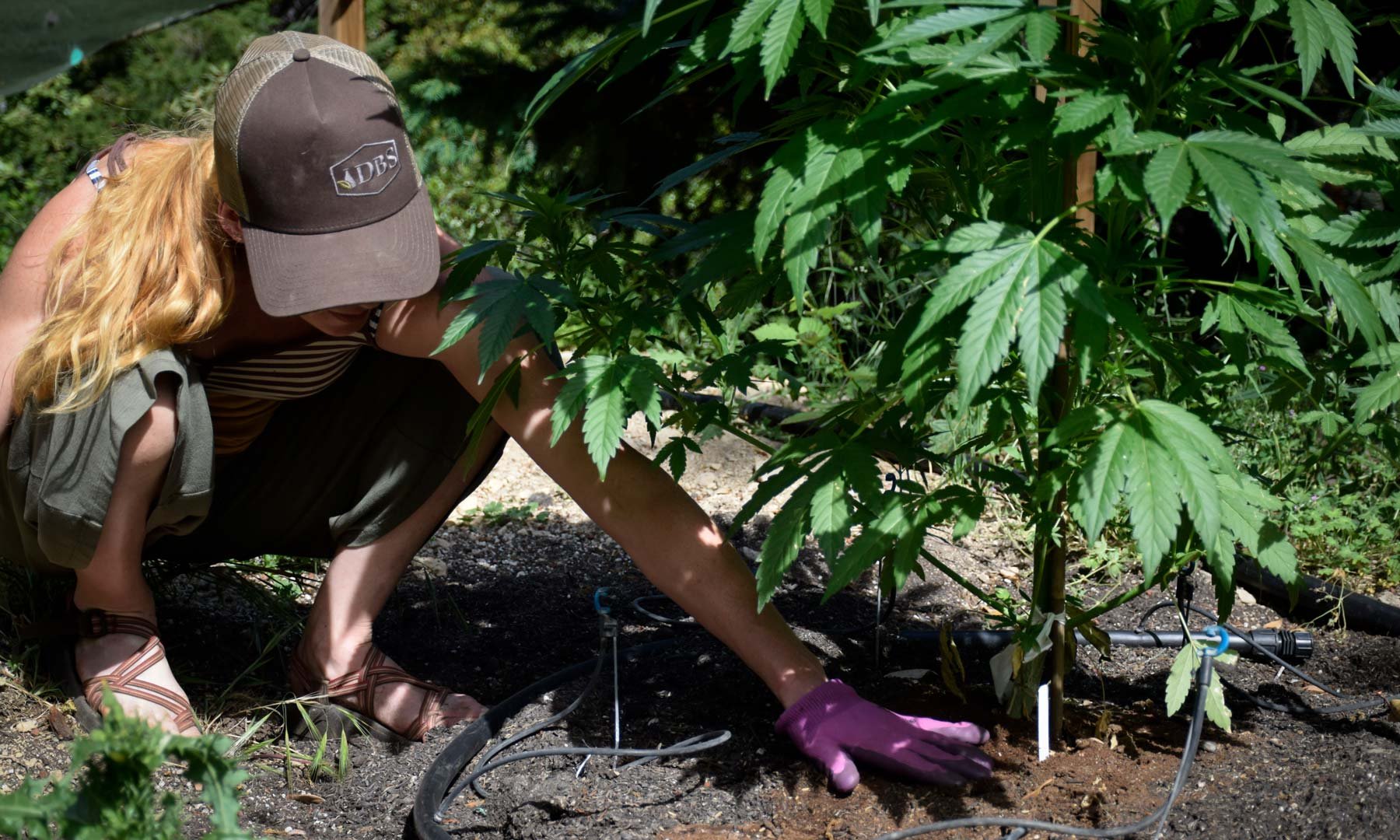From the Ground Up
Caring for the community and the earth
DBS’s Sarah Schuette applying her skills in the field.
Photograph courtesy of DBS.
The environment of Humboldt County has always been its bread-and-butter. Here on the North Coast of California, natural abundance is firmly a part of the county’s identity — past and present. It was this resource-rich land that ignited and fueled Humboldt’s world-famous cannabis cultivation industry.
Now nearly five decades in, our community and farmers are well aware that if we wish to continue enjoying the bounty of our natural resources, we must do everything we can to employ these resources sustainably. This is why the last decade has seen a number of agriculture and environmental firms rise to answer the call, including Dirty Business Soil Analytics, Mother Earth Engineering, SoilScape Solutions, Hollie Hall & Associates and more.
These eco-consultants, analysts and engineers serve the needs of Humboldt County cannabis farmers through a range of services, from large projects, such as watershed restoration and renewable energy systems, to more focused micro-services, such as customized amendment mixes and soil testing. While these firms may differ in their specialities, they have the shared goal of providing sustainable solutions for farmers so that they can produce high quality cannabis with minimal environmental impact.
Dirt makes the community difference
Dirty Business Soil Analytics (DBS) — started in 2012 by soil scientists Sarah Schuette and Joanna Berg — was the first certified on-site agricultural laboratory in the county. They offer a variety of holistic soil remediation techniques — including compost tea configurations, soil and nutrient analysis and amendment formulations, all which offer a natural way to restore healthy and vibrant populations of healthy soil microbes. These practices are designed to regenerate the soil while minimizing fertilizer use, salt accumulation and leaching.
DBS offers help beyond soil remediation, including plant tissue and water analysis, pest identification, comprehensive farm management plans and helpful educational workshops. All their services are designed to remediate environmental impacts while working as a kind of preventative medicine for farmers’ crops. Their guidance in these remediation techniques can mean all the difference between crop success and crop failure — both now and in the future
One such useful technique is integrated pest management (IPM). IPM is a sustainable agriculture method designed to reduce pesticide use through beneficial insects, companion plants and monitoring practices. It is also required for cannabis licensing.
DBS recognizes the value of an IPM plan not only for licensed cannabis cultivators but for all farmers looking to remediate their environmental impact. This is why they offer group IPM workshops in addition to one-on-one consultation plans. Some small-scale farmers simply can’t afford a personalized consultation and DBS views their group workshops as a great way to fill this need. Schuette says, “Cannabis farmers in particular haven’t had access to resources like other farmers have, which has set a lot of them up for failure. For example, many of these small-scale farmers have been beholden to expensive and unnecessary nutrients and don’t know anything about integrated pest management. These workshops are intended to help our farmers learn and become self-sufficient.”
According to the team at DBS, access to resources, education and self-sufficiency are key to success for sustainable cannabis farming. “The biggest need is affordable support,” Schuette says. “If I want my farmers to be successful, I have to meet them where they are. After all, on a practical level, their success helps my business. But on an emotional level, I really care about them and the community and I want both to thrive.”
Giving Mother Earth a seat at the table
Kendra Miers (left) and Patricia Lai of Mother Earth Engineering.
Photograph courtesy of Mother Earth Engineering.
Another Humboldt County company focused on protecting the Earth and empowering farmers is Mother Earth Engineering (MEE). MEE is a firm of civil environmental engineers started by Kendra Miers and Patricia Lai in 2016 in order to fulfill a need they saw in the county for engineering and planning for cannabis farmers. Their intention was to “give Mother Earth a seat at the table” and offer a holistic, balanced viewpoint in civil and environmental engineering. Their vision, in addition to helping Humboldt cannabis farmers implement sustainable practices, was to work in a way that was meaningful and sustainable to themselves.
Mother Earth Engineering is a full-service engineering firm, working with cannabis farmers on all levels of land development, renewable energy systems, hydrology and watershed restoration. It also offers consultation services for cannabis cultivation permitting and helps guide farmers through the ever-changing landscape of recreational compliance.
Compliance consultants are valuable to the Humboldt County cultivator. Requirements can differ from county to county and what the state allows isn’t always permissible in each county. It can be confusing for some cultivators, especially for those working on a small scale. As Miers notes, “Environmental regulations are stricter [for cannabis] than any other industry in history and a lot of farmers now are paying for the sins of the loggers from decades ago. It can be difficult to understand all the requirements — every time you think you have it down and that you’re totally within compliance, something else seems to pop up that you need. That misunderstanding has put a lot of small farmers out of business.”
MEE founders consider themselves working on the front lines with their clients. They, like DBS, are emotionally connected both to the environment and the community in Humboldt County. Schuette of DBS says, “What Humboldt County needs are good, quality consultants who care about the community and the environment. We think all of us can bring Humboldt to the highest standard and raise the bar even further.”
These eco-consultants don’t just want to help farmers become compliant. They want to empower them to make their cannabis cultivation practices truly sustainable, holistic and renewable.


